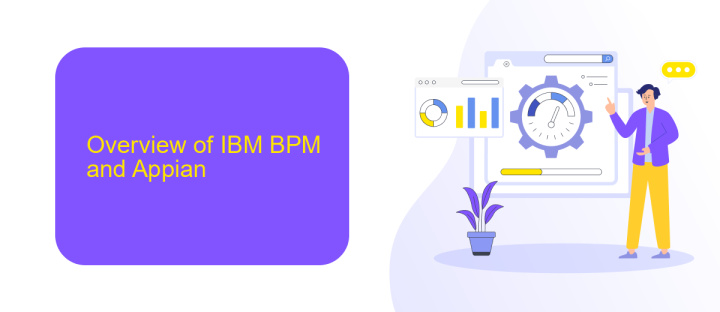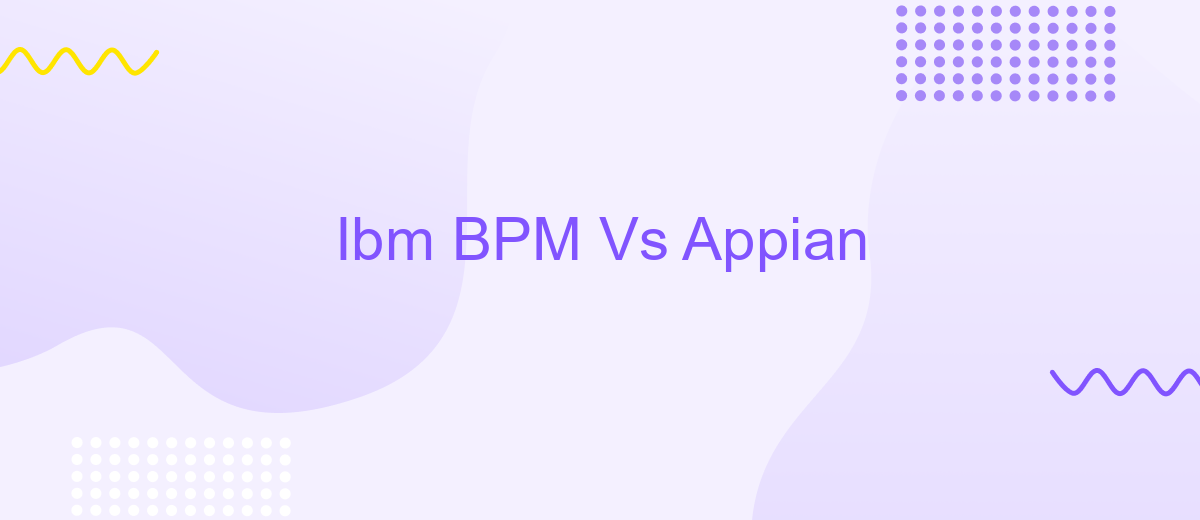Ibm BPM Vs Appian
In the rapidly evolving landscape of business process management (BPM), choosing the right platform is crucial for optimizing efficiency and achieving strategic goals. This article provides a comparative analysis of IBM BPM and Appian, two leading BPM solutions, highlighting their key features, strengths, and potential drawbacks. By understanding these differences, businesses can make informed decisions to enhance their operational workflows and drive innovation.
Introduction
In today's fast-paced business environment, organizations are constantly seeking efficient solutions to manage their processes and workflows. Two popular business process management (BPM) tools that have gained significant attention are IBM BPM and Appian. Both platforms offer robust capabilities to streamline operations, enhance productivity, and foster innovation. However, choosing the right tool can be a daunting task, given the unique features and benefits each platform provides.
- IBM BPM: Known for its comprehensive process modeling and integration capabilities.
- Appian: Renowned for its low-code development environment and user-friendly interface.
Both IBM BPM and Appian have their strengths and weaknesses, and the right choice often depends on the specific needs and goals of an organization. For instance, IBM BPM excels in complex process automation, while Appian is preferred for rapid application development. Moreover, integration services like ApiX-Drive can further enhance these platforms by enabling seamless connectivity with various third-party applications, ensuring a cohesive and efficient workflow.
Overview of IBM BPM and Appian

IBM BPM (Business Process Management) and Appian are two leading platforms in the realm of business process management. IBM BPM offers a comprehensive suite for modeling, executing, and optimizing business processes. It provides robust tools for workflow automation, real-time analytics, and process monitoring, enabling organizations to streamline operations and improve efficiency. Appian, on the other hand, is known for its low-code development capabilities, allowing users to design and deploy applications quickly with minimal coding. This accelerates the digital transformation process and enhances agility within business environments.
Both IBM BPM and Appian support integration with various third-party services to extend their functionality. For instance, ApiX-Drive can be utilized to facilitate seamless integration between these platforms and other business applications. This service simplifies the process of connecting different systems, ensuring data flows smoothly and processes remain synchronized. By leveraging ApiX-Drive, organizations can enhance their automation capabilities and achieve more cohesive operational workflows.
Comparison of Features and Capabilities

When comparing IBM BPM and Appian, it's essential to consider their distinct features and capabilities. Both platforms offer robust solutions for business process management, but they cater to different needs and preferences.
- Usability: IBM BPM provides a comprehensive set of tools with a steeper learning curve, while Appian is known for its user-friendly interface and ease of use.
- Integration: Appian excels in integration capabilities, allowing seamless connectivity with various systems. IBM BPM also supports integrations but may require more technical expertise.
- Customization: IBM BPM offers extensive customization options, making it suitable for complex, large-scale projects. Appian, on the other hand, provides rapid development features for quicker deployment.
- Scalability: Both platforms are highly scalable, but IBM BPM is often preferred for enterprise-level implementations, whereas Appian is favored for its flexibility and adaptability.
- Cost: Appian generally offers a more cost-effective solution, especially for smaller to mid-sized organizations, while IBM BPM may involve higher costs due to its extensive feature set.
In conclusion, the choice between IBM BPM and Appian depends on your organization's specific needs, budget, and technical expertise. For those looking for seamless integrations, services like ApiX-Drive can enhance the process by providing easy and efficient connectivity between various applications and systems.
Benefits and Drawbacks

Both IBM BPM and Appian offer robust business process management solutions, each with its own set of benefits and drawbacks. IBM BPM is highly regarded for its strong integration capabilities and extensive toolset, making it suitable for large enterprises with complex processes. On the other hand, Appian is known for its user-friendly interface and rapid development features, which can significantly reduce the time to market.
When considering these platforms, it's essential to weigh their respective advantages and disadvantages. IBM BPM's comprehensive features can be overwhelming for smaller businesses, while Appian's simplicity might not meet the needs of highly complex workflows.
- IBM BPM: Strong integration capabilities, extensive toolset, suitable for large enterprises.
- Appian: User-friendly interface, rapid development, suitable for quick deployments.
For businesses looking to streamline their integration processes, services like ApiX-Drive can be beneficial. ApiX-Drive offers a seamless way to connect various applications and automate workflows without requiring extensive technical knowledge. This can complement both IBM BPM and Appian by enhancing their integration capabilities and simplifying the overall process management.
Conclusion
In conclusion, both IBM BPM and Appian offer robust solutions for business process management, each with its unique strengths and weaknesses. IBM BPM excels in providing a comprehensive suite of tools for complex enterprise needs, making it a solid choice for large organizations with intricate workflows. On the other hand, Appian stands out for its user-friendly interface and rapid deployment capabilities, which are ideal for businesses seeking agility and quick implementation.
When considering integration capabilities, services like ApiX-Drive can significantly enhance the functionality of both platforms. ApiX-Drive allows seamless integration with various third-party applications, ensuring that your BPM system can communicate effectively with other tools in your tech stack. Ultimately, the choice between IBM BPM and Appian will depend on your specific business requirements, the complexity of your processes, and your need for integration flexibility.
FAQ
What are the main differences between IBM BPM and Appian?
Which platform is better for rapid application development?
Can both IBM BPM and Appian integrate with existing systems?
What are the deployment options for IBM BPM and Appian?
How can I automate and integrate processes more efficiently using these platforms?
Apix-Drive is a simple and efficient system connector that will help you automate routine tasks and optimize business processes. You can save time and money, direct these resources to more important purposes. Test ApiX-Drive and make sure that this tool will relieve your employees and after 5 minutes of settings your business will start working faster.

